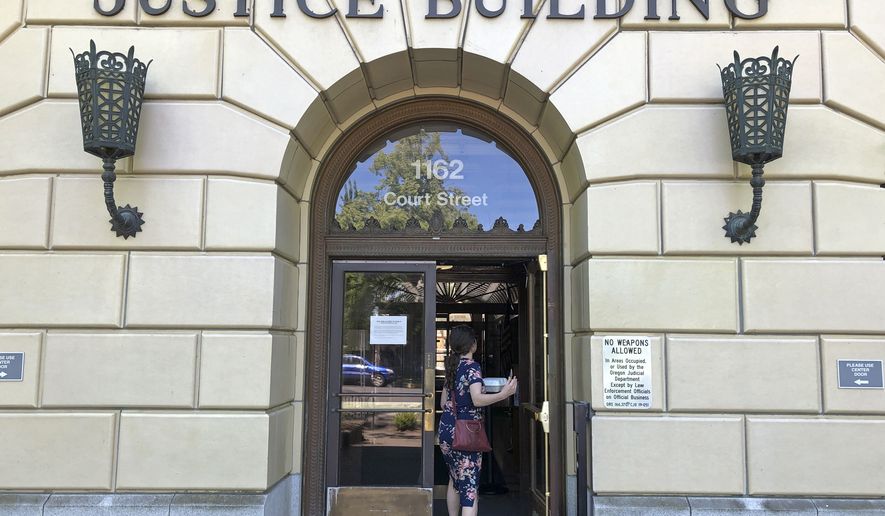OPINION:
Like a storyline from a TV show or a movie, government attorneys or trial lawyers file a high-profile lawsuit to get justice and compensation for aggrieved victims. Unfortunately, these stories too often miss out on a Hollywood ending.
The real cases often end with glowing press conferences for the politicians and trial lawyers, with little to show for the victims and devastated families they are supposed to be fighting for. Instead of helping victims, the money ends up lining the pockets of the trial lawyers or the politicians’ friends and special-interest allies.
In an example of this, look no further than the almost $600 million settlement that consulting giant McKinsey just inked with the nation’s state attorneys general, led by Attorney General Xavier Becerra — President Biden’s nominee for Health and Human Services Secretary.
McKinsey settled allegations that its consulting services helped contribute to the opioid crisis, allegations that arose from documents showing McKinsey urging opioid manufacturers to focus marketing efforts on doctors who were writing the most opioid prescriptions, a key group that is thought to have turbocharged the epidemic. But the McKinsey settlement money doesn’t look like it will be going to families who suffered and lost loved ones to the opioid crisis.
Instead of sending money to victims, the McKinsey deal starts off with the type of arrangement only a politician could love — $15 million to the nonprofit National Association of Attorneys General, known as NAAG. Amongst other things, NAAG hosts events across the country for state attorneys general and their staff, culminating in an annual Capital Forum in December just down the street from the White House, with the D.C. political class in attendance. And the remaining cash seems destined for government departments and state general fund accounts.
The agreement does say the money going to government should be used to remediate harms caused by the opioid epidemic “to the extent practicable.” But even that language may well be mere window dressing, as state appropriations provisions will almost certainly override once the money is deposited into government bank accounts.
To make matters worse, recent news reports suggest McKinsey might well profit off its own settlement, as its internal hedge fund affiliate has a stake in addiction treatment services that stand to get some of the settlement money once its flows through the gears of government.
Of course, state attorneys general are merely following the lead of the Biden and Obama administrations in diverting money toward favored special interests like NAAG instead of prioritizing victims.
One of President Biden’s first acts was undoing limits that prevent federal agencies from requiring donations to third parties as part of resolving enforcement actions. There were widespread reports of abuse in this area during the Obama administration, with huge settlements against the likes of Bank of America and Volkswagen being used to funnel money toward left-wing groups, administration priorities that couldn’t get through Congress, or special projects in favored states like California.
In response, the Trump administration clamped down on these types of settlement arrangements. But DOJ’s new leadership is already reversing course, paving the way for future climate change efforts by immediately undoing a Trump-era limit on donations to third-party environmental groups.
And it is not just politicians that like to give away money that belongs to victims — trial lawyers are just as eager to send money to favored allies at the expense of everyday consumers. For example, it is now all too common for privacy cases against major tech companies like Facebook and Google to end with trial lawyers and wealthy non-profits dividing millions between themselves, with no money for consumers.
Last month, the California-based Ninth Circuit Court of Appeals heard just such a case involving Google’s Street View Cars, Wi-Fi snooping claims, and $13 million in cash. There, the trial lawyers are fighting for the right to take millions for themselves and send the rest to groups like the ACLU, even though nothing is going to the everyday consumers who are their clients and allegedly had their privacy invaded by Google.
Whether it’s the Biden administration, the nation’s state attorneys general, or class action lawyers, there seems to be a growing problem of self-interested generosity with victims’ money. This is leaving everyday victims holding an empty bag while favored political constituencies and allies (including wealthy institutions like the ACLU and Harvard) reap millions. Both political parties seem to have embraced the value of getting money directly into the hands of everyday people in response to the pandemic. It’s high time they took the same approach when it comes to consumer protection.
As Attorney General Sessions said so well in explaining his reforms at the Department of Justice: when a case settles “against a corporate wrongdoer, any settlement funds should go first to the victims … not to bankroll third-party special interest groups or the political friends of whoever is in power.”
O.H. Skinner is the executive director of Alliance For Consumers, and a former Solicitor General of Arizona.




Please read our comment policy before commenting.